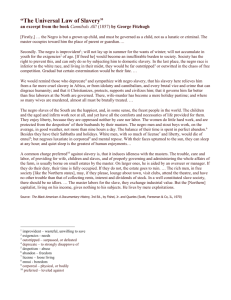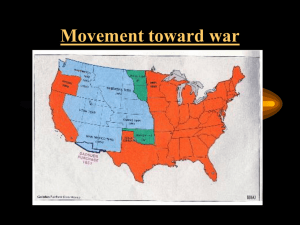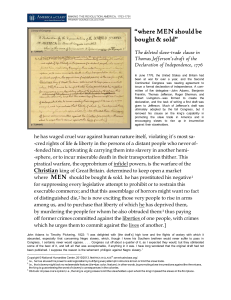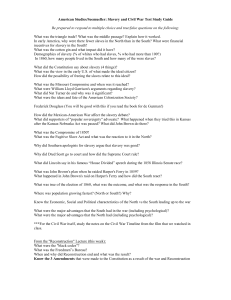Here - Scarsdale Union Free School District
advertisement
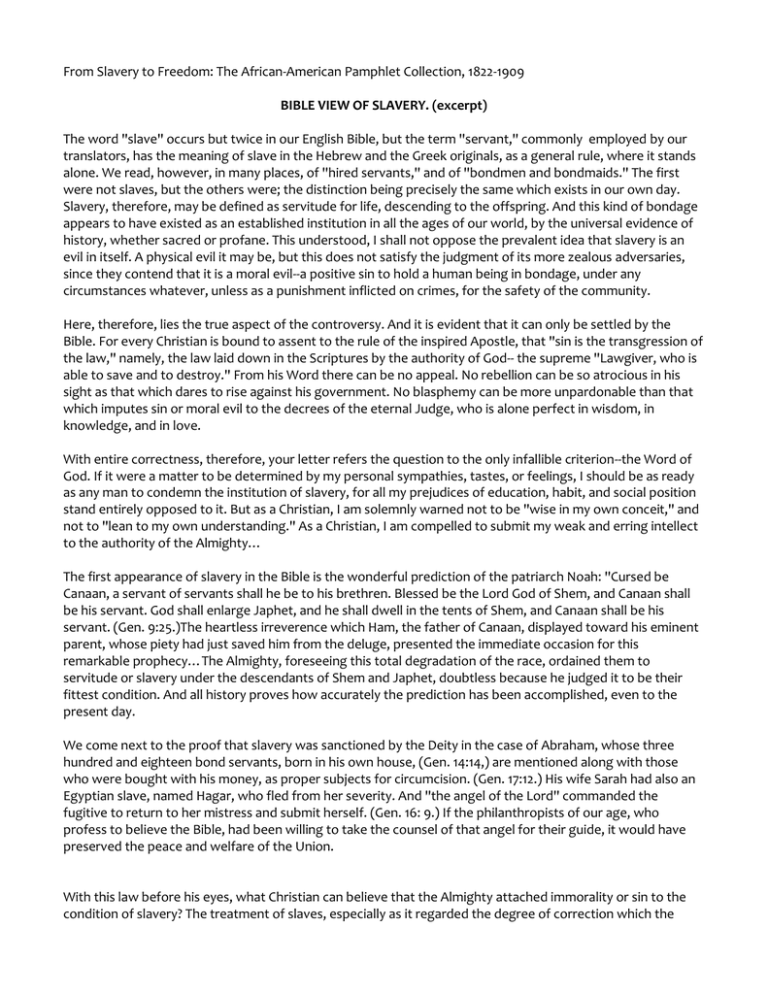
From Slavery to Freedom: The African-American Pamphlet Collection, 1822-1909 BIBLE VIEW OF SLAVERY. (excerpt) The word "slave" occurs but twice in our English Bible, but the term "servant," commonly employed by our translators, has the meaning of slave in the Hebrew and the Greek originals, as a general rule, where it stands alone. We read, however, in many places, of "hired servants," and of "bondmen and bondmaids." The first were not slaves, but the others were; the distinction being precisely the same which exists in our own day. Slavery, therefore, may be defined as servitude for life, descending to the offspring. And this kind of bondage appears to have existed as an established institution in all the ages of our world, by the universal evidence of history, whether sacred or profane. This understood, I shall not oppose the prevalent idea that slavery is an evil in itself. A physical evil it may be, but this does not satisfy the judgment of its more zealous adversaries, since they contend that it is a moral evil--a positive sin to hold a human being in bondage, under any circumstances whatever, unless as a punishment inflicted on crimes, for the safety of the community. Here, therefore, lies the true aspect of the controversy. And it is evident that it can only be settled by the Bible. For every Christian is bound to assent to the rule of the inspired Apostle, that "sin is the transgression of the law," namely, the law laid down in the Scriptures by the authority of God-- the supreme "Lawgiver, who is able to save and to destroy." From his Word there can be no appeal. No rebellion can be so atrocious in his sight as that which dares to rise against his government. No blasphemy can be more unpardonable than that which imputes sin or moral evil to the decrees of the eternal Judge, who is alone perfect in wisdom, in knowledge, and in love. With entire correctness, therefore, your letter refers the question to the only infallible criterion--the Word of God. If it were a matter to be determined by my personal sympathies, tastes, or feelings, I should be as ready as any man to condemn the institution of slavery, for all my prejudices of education, habit, and social position stand entirely opposed to it. But as a Christian, I am solemnly warned not to be "wise in my own conceit," and not to "lean to my own understanding." As a Christian, I am compelled to submit my weak and erring intellect to the authority of the Almighty… The first appearance of slavery in the Bible is the wonderful prediction of the patriarch Noah: "Cursed be Canaan, a servant of servants shall he be to his brethren. Blessed be the Lord God of Shem, and Canaan shall be his servant. God shall enlarge Japhet, and he shall dwell in the tents of Shem, and Canaan shall be his servant. (Gen. 9:25.)The heartless irreverence which Ham, the father of Canaan, displayed toward his eminent parent, whose piety had just saved him from the deluge, presented the immediate occasion for this remarkable prophecy…The Almighty, foreseeing this total degradation of the race, ordained them to servitude or slavery under the descendants of Shem and Japhet, doubtless because he judged it to be their fittest condition. And all history proves how accurately the prediction has been accomplished, even to the present day. We come next to the proof that slavery was sanctioned by the Deity in the case of Abraham, whose three hundred and eighteen bond servants, born in his own house, (Gen. 14:14,) are mentioned along with those who were bought with his money, as proper subjects for circumcision. (Gen. 17:12.) His wife Sarah had also an Egyptian slave, named Hagar, who fled from her severity. And "the angel of the Lord" commanded the fugitive to return to her mistress and submit herself. (Gen. 16: 9.) If the philanthropists of our age, who profess to believe the Bible, had been willing to take the counsel of that angel for their guide, it would have preserved the peace and welfare of the Union. With this law before his eyes, what Christian can believe that the Almighty attached immorality or sin to the condition of slavery? The treatment of slaves, especially as it regarded the degree of correction which the master might administer, occurs in the same chapter, as follows: "If a man smite his servant or his maid with a rod, and he die under his hand, he shall be surely punished. Notwithstanding if he continue a day or two, he shall not be punished; for he is his money." (Exod. 21:20, 21.) And again, If a man smite the eye of his servant or the eye of his maid, that it perish, he shall let him go free for his eye's sake. And if he smite out his manservant's tooth, or his maid-servant's tooth, he shall let him go free for his tooth's sake." (Exod. 21:26, 27.) Here we see that the master was authorized to use corporal correction toward his slaves, within certain limits. When immediate death ensued, he was to be punished as the judges might determine. But for all that came short of this, the loss of his property was held to be a sufficient penalty. I remain, with great regard, Your faithful servant in Christ, John H. Hopkins, Bishop of the Diocese of Vermont. White Supremacy and Negro Subordination by J.H. Van Evrie (1868) John H. Van Evrie (1814-1896) was a physician in New York and part owner of a firm that published a magazine, The Old Guard (18621870), defending the South and the institution of slavery. He wrote Negroes and Negro “Slavery” (1853) and Subgenation: The Theory of the Normal Relation of the Races (1864). In White Supremacy and Negro Subordination (1868), his most unrestrained treatise, Van Evrie appeals to religion in proclaiming the radical difference, and inferiority, of African Americans to whites. The Negro is a different being from the white man, and therefore, of necessity, was designed by the Almighty Creator to live a different life, and to disregard this – to shut our eyes and blindly beat our brains against the decree – the eternal purpose of God himself, and force this negro to live our life, necessarily destroys him, for surely human forces can not dominate or set aside those of Omnipotence…. Furthermore, they are vicious as well as idle and non-productive, and every one of them a disturbing force – a dangerous element – which, in conjunction with those hideous wretches maddened with a monstrous theory like those miscreants at Harper’s Ferry, are always liable to be made instruments of fearful mischief…. The negro in his normal condition has attractive qualities. He is not degraded, for none of God’s creatures are naturally degraded, and his fidelity and affection for his master and his master’s family, sometimes reach a dignity that would reflect honor on the white man. Nor is there any prejudice or hatred between the races when they are in true relation to each other. One may travel for months, perhaps years, in the South, and never witness a collision or the slightest disturbance between them; but, on the contrary, they will often see a kindly feeling displayed even when the negro is not owned by those who exhibit it. The negro is in a social position and relation that accords with his nature, his wants, the purposes that God has adapted him to, in short, lives out his own life, and therefore, all that is good, that is healthy in his moral nature as in his physical nature, is duly manifested. But in the North, where he is thrust from his nature sphere and forced to live out the life of a different being, he exhibits the same moral defects that he does in his physical nature. He is a social monstrosity – and though his subordinate nature renders him less likely to commit great crimes than the superior white man, the tendencies to petty immoralities are almost universal… …God created him a negro – a different and inferior being, and, therefore, designed him for a different and inferior social position… To the negro it is death [freedom from slavery] – necessarily death, as it always must be to all creatures, human or animal, forbidden to live the life God has blessed them with, or to live in accord with the conditions He has imposed on them. The ultimate doom of the poor creatures, therefore, is only a question of time….it is absolutely certain that, as a class, they will become extinct, and a hundred years hence it is reasonable to suppose that no such social monstrosity as a “free negro” will be found in America. Sociology for the South by George Fitzhugh The Virginia lawyer George Fitzhugh (1806-1881) was the author of numerous pro-slavery treatises, including Slavery Justified (1850), What Shall Be Done with the Free Negroes (1851), and Cannibals All! or, Slaves Without Masters (1857). In Sociology for the South(1854) Fitzhugh asserts that slavery in America is less harsh than slavery elsewhere and that rabid abolitionists are actually hindering the gradual amelioration of the slaves’ condition. …Now it has been the practice in all countries and in all ages, in some degree, to accommodate the amount and character of government control to the wants, intelligence, and moral capacities of the nations or individuals to be governed. A highly moral and intellectual people, like the free citizens of ancient Athens, are best governed by a democracy. For a less moral and intellectual one, a limited and constitutional monarchy will answer. For a people either very ignorant or very wicked, nothing short of military despotism will suffice. So among individuals, the most moral and well-informed members of society require no other government than law. They are capable of reading and understanding the law, and have sufficient self-control and virtuous disposition to obey it. Children cannot be governed by mere law; first, because they do not understand it, and secondly, because they are so under the influence of impulse, passion and appetite, that they want sufficient self-control to be deterred or governed by the distant and doubtful penalties of the law. They must be constantly controlled by parents or guardians, whose will and orders shall stand in the place of law for them. …Now, it is clear the Athenian democracy would not suit a negro nation, nor will the government of mere law suffice for the individual negro. He is but a grown up child, and must be governed as a child, not as a lunatic or criminal. The master occupies towards him the place of parent or guardian. … Secondly, The negro is improvident; will not lay up in summer for the wants of winter; will not accumulate in youth for the exigencies of age. He would become an insufferable burden to society. Society has the right to prevent this, and can only do so by subjecting him to domestic slavery. In the last place, the negro race is inferior to the white race, and living in their midst, they would be far outstripped or outwitted in the chase of free competition. Gradual but certain extermination would be their fate. … Would the abolitionists approve of a system of society that set white children free, and remitted them at the age of fourteen, males and females, to all the rights, both as to person and property, which belong to adults? Would it be criminal or praiseworthy to do so? Criminal, of course. Now are the average of negroes equal in formation, in native intelligence, in prudence or providence, to well-informed white children of fourteen? We who have lived with them for forty years, think not. The competition of the world would be too much for the children. They would be cheated out of their property and debased in their morals. …What is the difference between the authority of a parent and of a master? Neither pay wages, and each is entitled to the services of those subject to him. …Let him stand in loco parentis, and call him papa instead of master. Slavery in America By William Gilmore Simms William Gilmore Simms (1806-1870) was a prominent southern writer in the two decades prior to the Civil War. Residing for most of his life in Charleston, he was a voluminous poet and author of novels and romances in the tradition of Sir Walter Scott and James Fenimore Cooper. Simms was a vigorous supporter of the institution of slavery. In Slavery in America – first published as a review of Harriet Martineau’s Society in America in the Southern Literary Messenger for November 1837 and issued the next year as a pamphlet – Simms maintains that slavery is a positive good for African Americans, since in his view they lack the capacity for self-government. …Pity it is, that the lousy and lounging lazzaroni of Italy, cannot be made to labor in the fields, under the whip of a severe task-master! They would them be a much freer – and certainly a much nobler animal – than we can possibly esteem them now; -- and far better had it been for our native North American savage, could he have been reduced to servitude, and, by a labor imposed upon him, within his strength and moderately accommodated to his habits, have been preserved from that painful and eating decay, which has left but a raw and naked skeleton of what was once a numerous and various people. …It is his mental and moral inferiority which has enslaved, or subjected him to a superior. It is his rise, morally and intellectually into the same form with his master, which alone can emancipate him. It is possible that a time will come, when, taught by our schools, and made strong by our training, the negroes of the Southern States may arrive at freedom; then at least, his condition may be such as would entitle him to go forth out of bondage. It may be, when that time comes, that, like Pharaoh, we too shall prove unwilling to give up our bondmen. But that time is very far remote, is sufficiently evident from the condition of the free negroes in the Northern States, and elsewhere – the British West Indies, for example. There, in both regions, without restraints of any kind, they rather decline to a worse brutality, with every increase of privilege… …Regard the slave of Carolina, with a proper reference to the condition of the cannibal African from whom he has been rescued, and say if his bondage has not increased his value to himself, not less than to his master. We contend that it found him a cannibal, destined in his own country to eat his fellow, or to be eaten by him; -- that it brought him to a land in which he suffers no risk of life or limb, other than that to which his owner is equally subjected; -that it increases his fecundity infinitely beyond that of the people from whom he has been taken – that it increases his health and strength, improves his physical symmetry and animal organization – that it elevates his mind and morals – that it extends his term of life – that it gives him a better and more certain food, better clothing, and more kind and valuable attendance when his is sick. These clearly establish the morality of the slave institutions in the South… "The 'Mudsill' Theory" by James Henry Hammond (1858) James Henry Hammond was a senator and wealthy plantation owner from South Carolina. This excerpt is from a speech he made to the Senate on March 4, 1858, in which he lays out his famous "mudsill theory" and states, "In all societies that must be a class to do the menial duties, to perform the drudgery of life." This class, says Hammond, makes it possible for the higher class to move civilization forward. In the antebellum period, pro-slavery forces moved from defending slavery as a necessary evil to expounding it as a positive good. Some insisted that African Americans were child-like people in need of protection, and that slavery provided a civilizing influence. Others argued that black people were biologically inferior to white people and were incapable of assimilating in free society. Still others claimed that slaves were necessary to maintain the progress of white society. Speech to the U.S. Senate, March 4, 1858 In all social systems there must be a class to do the menial duties, to perform the drudgery of life. That is, a class requiring but a low order of intellect and but little skill. Its requisites are vigor, docility, fidelity. Such a class you must have, or you would not have that other class which leads progress, civilization, and refinement. It constitutes the very mud-sill of society and of political government; and you might as well attempt to build a house in the air, as to build either the one or the other, except on this mud-sill. Fortunately for the South, she found a race adapted to that purpose to her hand. A race inferior to her own, but eminently qualified in temper, in vigor, in docility, in capacity to stand the climate, to answer all her purposes. We use them for our purpose, and call them slaves. We found them slaves by the common "consent of mankind," which, according to Cicero, "lex naturae est." The highest proof of what is Nature's law. We are old-fashioned at the South yet; slave is a word discarded now by "ears polite;" I will not characterize that class at the North by that term; but you have it; it is there; it is everywhere; it is eternal. The Senator from New York said yesterday that the whole world had abolished slavery. Aye, the name, but not the thing; all the powers of the earth cannot abolish that. God only can do it when he repeals the fiat, "the poor ye always have with you;" for the man who lives by daily labor, and scarcely lives at that, and who has to put out his labor in the market, and take the best he can get for it; in short, your whole hireling class of manual laborers and "operatives," as you call them, are essentially slaves. The difference between us is, that our slaves are hired for life and well compensated; there is no starvation, no begging, no want of employment among our people, and not too much employment either. Yours are hired by the day, not cared for, and scantily compensated, which may be proved in the most painful manner, at any hour in any street in any of your large towns. Why, you meet more beggars in one day, in any single street of the city of New York, than you would meet in a lifetime in the whole South. We do not think that whites should be slaves either by law or necessity. Our slaves are black, of another and inferior race. The status in which we have placed them is an elevation. They are elevated from the condition in which God first created them, by being made our slaves. None of that race on the whole face of the globe can be compared with the slaves of the South. They are happy, content, unaspiring, and utterly incapable, from intellectual weakness, ever to give us any trouble by their aspirations. Yours are white, of your own race; you are brothers of one blood. They are your equals in natural endowment of intellect, and they feel galled by their degradation. Our slaves do not vote. We give them no political power. Yours do vote, and, being the majority, they are the depositories of all your political power. If they knew the tremendous secret, that the ballot-box is stronger than "an army with banners," and could combine, where would you be? Your society would be reconstructed, your government overthrown, your property divided, not as they have mistakenly attempted to initiate such proceedings by meeting in parks, with arms in their hands, but by the quiet process of the ballot-box. You have been making war upon us to our very hearthstones. How would you like for us to send lecturers and agitators North, to teach these people this, to aid in combining, and to lead them?
